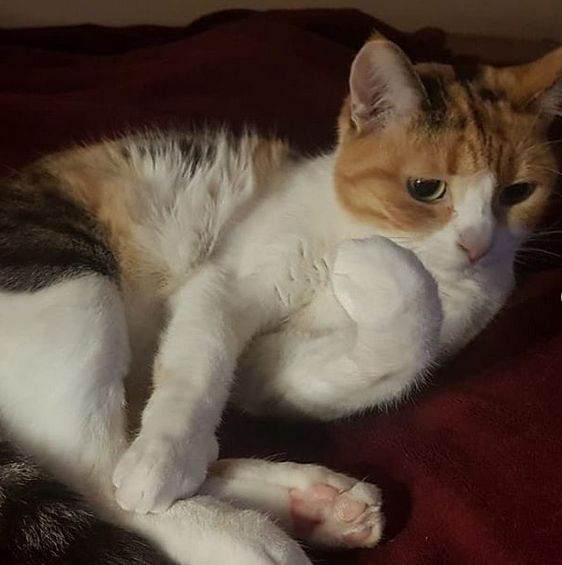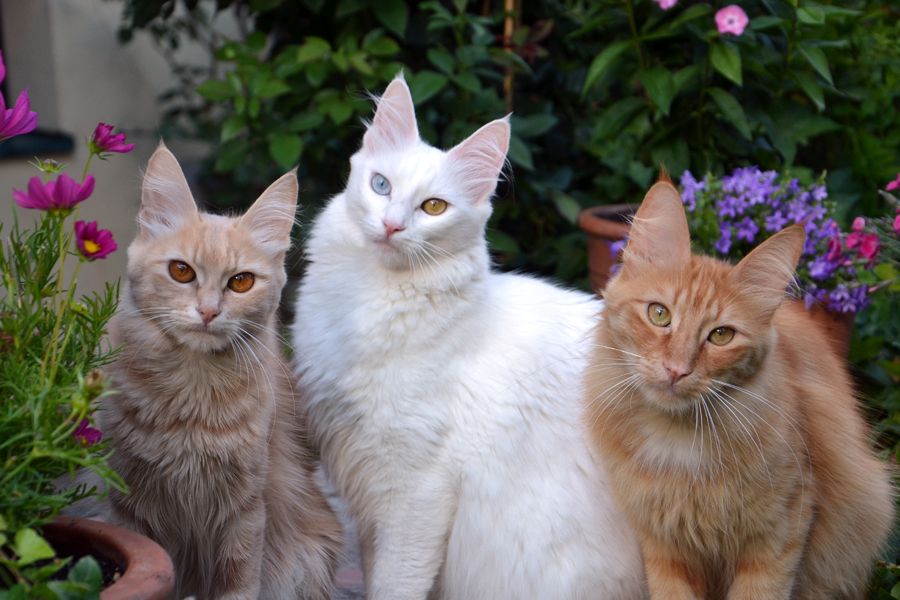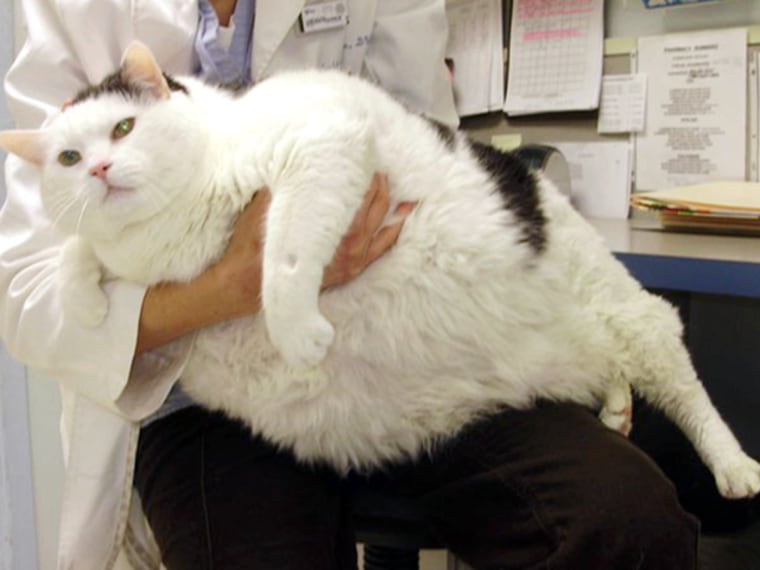Cats are often considered self-sufficient creatures who can easily handle loss and change. However, the reality is that cats can experience grief and may exhibit behavioral changes after a companion’s death.
Whether they were close friends or constant adversaries, cats can feel the absence of another feline in the household.
What are the telltale indicators that a cat is suffering from grief?

While we may never honestly know what goes on inside a cat’s mind, it’s clear that they are sensitive to changes in their environment and can pick up on the emotions of those around them. If your cat died and you’re worried about how your remaining feline friend is coping, here are some tips and guidance on helping your grieving cat through this challenging time.
Losing a beloved pet can be a heart-wrenching experience for humans and animals. While it can be tough to help surviving pets cope with the loss of their companion, it’s important to remember that cats indeed grieve. They may not be able to express their emotions to us the same way we do, but that doesn’t mean they aren’t feeling a deep sense of loss and sadness.
While your cat may not show any visible signs of grief, the loss of its companion can significantly impact the behavior of some cats. Changes in behavior are a common way for bereaved animals, such as pets, to communicate their grief and feelings of loss.
Separation anxiety can be a form of grieving in and of itself. Your cat may struggle to come to terms with the fact that someone they love is no longer there.
By being understanding and supportive, you can help your grieving cat navigate this difficult time.
While every cat will grieve uniquely, some behaviors are common among cats struggling to cope with losing a companion. If you notice any of the following signs in your cat, it may be a sign that they are grieving:
- Loss of appetite
- Changes in sleep patterns
- Restlessness or wandering
- Changes in confidence
- Searching or crying
- Changes in interest in activities
- General sadness or lethargy
- Attention seeking
- Changes in its use of space
Remember that these behaviors can have other causes, and it’s always a good idea to consult with a veterinarian or behaviorist if you are concerned about your cat’s well-being.
But if you notice these signs in your cat, they may struggle to cope with their companion’s loss. By being understanding and supportive, you can help your grieving cat navigate this difficult time.
How to help your grieving cat?

#1 – Stick to a Familiar Routine
After losing their companion, it’s crucial to maintain order and predictability in your grieving cat’s life by adhering to a tried-and-true schedule.
Cats are creatures of habit that do best with a consistent daily routine. Your cat may benefit from having a pattern that is maintained regularly to help reduce stress and provide a sense of security and comfort during this difficult time.
This can include set hours for feeding, playtime, and grooming practices regularly. By sticking to a familiar routine, you can help your cat adjust to the changes in the household and provide a sense of stability and comfort.
#2 – Give Lots of Love and Attention

During this challenging time, it’s vital to offer your grieving cat extra love, attention, and mental and physical stimulation by spending quality time with it.
Providing your cat with other affection and attention can help them feel comforted and loved and can help reduce feelings of loneliness and boredom. You can also help keep your cat engaged and active by providing them with interactive toys, puzzles, or play sessions.
By showing your cat extra care and attention, you can help them feel more secure and at ease as they adjust to the loss of their companion.
#3 – Respect Boundaries
On the other hand, despite needing to show affection, too much can also be quite overwhelming. You may be tempted to continually shower your remaining cat with extra attention after losing its companion. Still, it’s important to avoid increasing the amount of attention you provide.
Doing so can be stressful and overwhelming for your cat. Instead, it’s essential to maintain the same level of attention and care you provided.
This will help your cat feel more secure and at ease rather than adding to their stress and confusion during this difficult time.
#4 – Consider Before Getting a New Pet

Before getting a new pet, you should consider your cat’s requirements first. You must wait until your grieving cat has had sufficient time to adjust to the death of their buddy before bringing a new pet into the home.
Be patient with your cat and allow them the time they need to grieve the loss of their loved one since it may take several weeks or even months for a cat to adjust to the situation entirely.
Before introducing your cat to a new friend, it is essential to evaluate your cat’s specific requirements and personality to ensure that the two will get along well.
#5 – Talk to Your Cat Cheerfully
After losing their companion, it’s essential to communicate with your grieving cat and have a cheerful attitude. Cats may not understand our words but can pick up on our emotions.
You can help your cat feel more at ease and comfortable by speaking to them in a positive, reassuring tone, which can provide a sense of comfort and familiarity. Maintaining a positive attitude around your grieving cat is also essential, as they may be sensitive to negative emotions and need extra support during this difficult time.
Being present and supportive can help your cat feel more at home and relaxed as they navigate the loss of their companion.
#6 – Entertain Your Cat with Toys
It can be helpful to provide your grieving cat with toys, puzzles, or other forms of entertainment while you are away. This can help alleviate feelings of boredom and loneliness.
The loss of their companion can be a difficult and stressful time for your cat. Providing them with mental and physical stimulation can help keep their mind active and provide some sense of normalcy.
It’s a good idea to keep various toys and puzzles on hand to help keep your cat entertained and engaged while you are away.
#7 – Play Some Music
Consider playing music for your grieving cat to help lift your cat’s spirits and provide comfort during this difficult time.
Music has been shown to have a calming effect on cats and can help improve their mood. Playing music with an upbeat tempo or that your cat associates with happy occasions can be beneficial in lifting their spirits.
You may also find that slower, more soothing music, such as harp music, can have a calming effect on your cat. Experiment with different types of music to see what works best for your cat, and be sure to play the music at a comfortable volume.
#8 – Consider Giving Natural Antidepressants

You may consider giving them natural antidepressants like St. John’s Wort if you’re looking for ways to help your grieving cat feel better. This herb has been shown to have antidepressant properties in humans, and it may also be helpful for your cat.
However, it’s essential to consult a veterinarian before giving your cat any medications, as dosing and potential interactions with other medicines must be considered. Your veterinarian may be able to prescribe a stronger antidepressant medication if your cat’s depression persists and doesn’t show any signs of improvement.
It’s also worth noting that natural remedies may not be suitable for every cat. Hence, it’s always best to check with a professional before trying anything new.
#9 – Invite Friends Over for Socialization
If your grieving cat enjoys socialization and company, inviting friends to visit and interact with them can be a helpful distraction from their loss.
However, it’s essential to ensure your cat has plenty of space and time to retreat if they ever seem overwhelmed or need a break. By offering your cat a balance of socialization and solitude, you can help them find comfort and joy during this difficult time.
So, consider inviting friends to visit and interact with your cat, and give them plenty of space and time to rest when they need it.
#10 – Encourage Good Behavior
It’s not uncommon for cats to exhibit behavior changes after losing a companion, such as vocalizing or meowing without being provoked.
While it can be difficult to ignore this behavior, it’s essential to resist the temptation to reward or reinforce it. Instead, focus on praising your cat and reinforcing good behavior with rewards and positive reinforcement strategies.
By consistently praising good behavior and ignoring inappropriate behavior, you can help your grieving cat learn to cope and adjust to the changes in their environment. It may take time and patience, but with the right approach, you can help your cat through this challenging time.
#11 – Consider Medical Therapy
If necessary, take into consideration the use of drugs or other therapies.
When your cat displays extreme grief or sadness that does not improve with time, it may be beneficial to speak with a veterinarian or a cat behaviorist. Talk to them about the possibility of using drugs or other interventions to assist your cat in coping with the loss they have experienced.
Pheromone therapy, dietary supplements, and pharmaceuticals prescribed by a doctor are some examples of these.
#12 – Provide a Safe and Comfortable Environment
Providing your grieving cat with a safe and comfortable environment is essential to help reduce stress and give a sense of security.
This can include creating a calm and peaceful environment by minimizing loud noises or chaotic distractions. It is also beneficial to give your cat plenty of space and time to adjust to the loss. Please provide them with various ways to express their emotions, such as through play, grooming, or exploring their surroundings.
It may be helpful to consult with a veterinarian or cat behaviorist for additional support and guidance if your cat’s behavior changes significantly or persists for an extended time. Remember to also take care of yourself during this difficult time and seek help from other cat owners or a support group if needed.
#13 – Give Your Cat Some Space and Time to Grieve Alone

It is crucial to give your grieving cat the space and time they need to adjust to their loss. It is essential to allow them to process their emotions at their own pace without feeling pressured to participate in activities like socializing or playing before they are ready.
Make sure your cat has plenty of room to move around and explore. Provide a peaceful and comfortable environment to help reduce stress and create a sense of security. Remember to be patient and understanding as your cat navigates this difficult time, and don’t hesitate to seek the guidance of a veterinarian or cat behaviorist if you have any concerns.
Together, you can help your feline friend through this challenging period and support them on their journey toward healing.
#14 – Consult a Cat Behaviorist or Veterinarian
It’s important to remember that grief is a natural and normal response to loss, and your cat is no exception. It may be helpful to seek the advice of a feline behaviorist or veterinarian if you’re struggling to help your cat cope with its grief.
These professionals can offer specific guidance and techniques to help your cat through this challenging time.
It’s also worth noting that each cat is unique and may grieve differently. Hence, it’s essential to be patient and understanding as your cat navigates this process.
#15 – Feed Them a Healthy Diet

It is crucial to continue providing your grieving cat with a healthy and balanced diet to support their overall well-being during this difficult time.
Cats may experience changes in appetite when grieving. It’s vital to pay close attention to their food intake and ensure they are getting the nutrients they need.
Try offering your cat some small meals more frequently throughout the day, or try different types of food to see what they may be more inclined to eat. It is also essential to ensure that your cat has access to clean water.
#16 – Reach out to Friends for Support
You can seek support from other cat owners or a support group. This can be especially helpful if you have difficulty coping with your cat’s grief.
It can be comforting to talk to other people who have been through similar experiences, and it can also allow you to exchange insights and advice with them.
Having a group of people you can lean on for support during this trying time is another thing that might be useful.
Final Thoughts
As you navigate the grief of losing a beloved pet, it’s essential to consider the needs and well-being of your remaining cat. While it may be tempting to introduce a new companion immediately, taking the time to assess your cat’s needs is necessary. Make sure they are ready for another feline friend.
Every cat is different, and what works for one may not work for another. Trust your instincts and do what feels suitable for you and your cat. It’s also important to remember that cats are naturally solitary creatures and do not necessarily require the company of other cats to be happy.
While it’s natural to want to provide support and comfort for your grieving cat, it’s also essential to give them space and time. Like humans, they need to adjust to the loss of their companion. With patience, understanding, and a little love, you can help your cat through this challenging time and find a new sense of normalcy.
Further Reading





